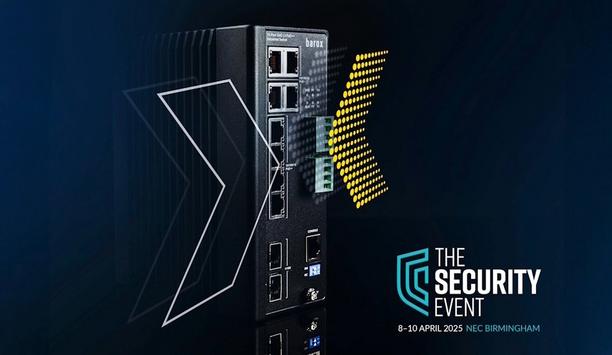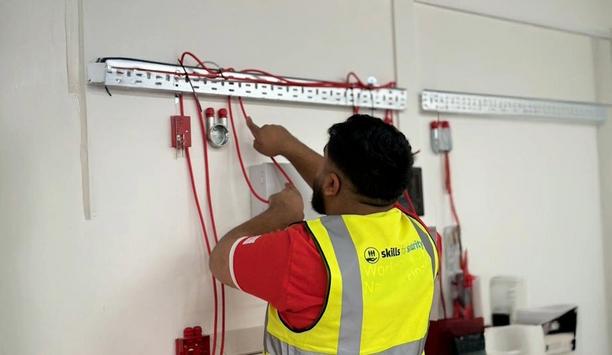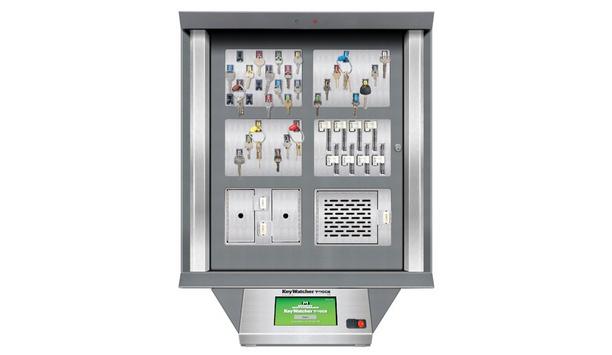Round table discussions
Historically, biometrics applications have often been thought of as specialised, high-tech and used predominantly in governmental markets. Everyday systems have tended toward card readers and keypads, while biometrics have been associated with high-security applications. Today, however, biometrics are much more mainstream. Fingerprint readers, in particular, are as near as our smart phones. Many other biometric applications are also becoming more common in a wide variety of markets. We asked thi...
People using computers to surf the Internet is "so 20th century". Today, the big trend involves machines using the Internet to communicate, exchange and analyse data in what has widely become known of as the Internet of Things. Various security devices are among the IoT components, and how devices connect effectively using the Internet – even devices not related to security – will constitute a large part of the future business of security integrators and installers, whether in the re...
With more physical security systems using Internet protocol and being connected to the enterprise IT network, it’s not surprising that the corporate IT department is more involved than ever in the buying decision – for better or worse. Does the IT department bring valuable resources to the table, or are they an impediment to the sales and integration process? It’s not a new issue, but an increasingly important one as the industry changes. We asked this week’s Expert Panel...
Software changes constantly. There’s always a new patch or fix, and our computers persistently remind us that an update is available. As a core component of today’s IP networked video systems, video management software (VMS) is also subject to the need to be constantly updated and refined. We asked our Expert Panel Roundtable to elaborate: Why is it important that networked video customers keep up to date with the latest version of video management software (VMS)?
The industry is counting down to the big industry trade show this fall, the ASIS International 61st Annual Seminar and Exhibits — ASIS 2015 in Anaheim, California. What topics will dominate the traditionally end user-based show in a year of shifting technologies and new capabilities on the horizon? We asked our Expert Panel Round Table to weigh in.
College campuses often operate like small communities – or even like large communities depending on enrolment. Although each college and university campus is unique, there are commonalities such as a young and vulnerable population of students, many living away from their parents for the first time. Campuses can be urban or rural, geographically dispersed or densely populated, with a variety of demographics and “wild card” elements such as partying, drugs and alcohol. Campus po...
Most of today’s video surveillance cameras are capable of providing audio, but when should it be implemented? Acceptable uses of audio surveillance, as opposed to video, are a different concept in many jurisdictions worldwide. Privacy laws regarding audio may be more stringent than those for video, but both tend to centre around the concept of an “expectation of privacy,” which may mean something different in the case of audio versus video. How can system designers and end user...
An eruption of violence at a church in Charleston, S.C., this June has increased awareness of the potential for such incidents at our houses of worship. On June 17 at Emanuel African Methodist Episcopal (AME) Church in downtown Charleston, a 21-year-old attacker wielding a Glock 41 .45-caliber handgun took the lives of nine people. But it was far from the first security breach at a house of worship. In fact, since 1999, more than 500 people have died a violent death on church or faith-based prop...
More and more physical security systems are being hosted in the cloud. But are cloud-based security systems “safe?” It’s a question being posed by risk-averse security professionals all over the world, and one for which a clear, concise answer may be difficult to find. We decided to pose it to our Expert Panel.
Any business sees its share of highs and low, of flare-ups and lulls. In the security market, several factors can impact general business trends, whether at the macro level or for an individual manufacturer or integrator. The economy is always a factor in the business climate, but are there others? We asked our Expert Panel to assess the impact of another variable – the seasons. Specifically, we asked this week’s Expert Panel: What is the seasonal impact on sales of security technolo...
Violence in our schools and colleges often makes headlines, suggesting a growing and scary trend. A consequence of high-profile school shootings and other reports of violence is to increase awareness of the need to ensure safety and security of students, faculty and staff. The events have prompted more than one educational institution to take a second look at their security policies and infrastructure, with an eye toward improvement. But to what effect? Has greater awareness of violence in educa...
We asked this week’s Expert Panel: What are the limitations on where video cameras can be placed because of privacy? With hundreds of new cameras installed every day, the likelihood increases exponentially that a camera will be placed in a location where it violates privacy. In fact, threats to privacy are often among the largest objections when video surveillance is proposed, whether in a public area or in the workplace. Allaying fears about undermining privacy is a basic requirement to m...
We have all heard the sales pitch: Use of megapixel cameras lowers the camera count needed to provide adequate video coverage, thus making the overall system less expensive. Use of fewer cameras equates to less infrastructure, bandwidth and storage, according to the claims, and megapixel cameras provide enough detail that you don’t miss anything using fewer cameras. It’s a compelling pitch, but one that has sometimes been questioned in the market. To look beyond the marketing hype, w...
Salesmen may face pressure to “seal the deal,” but might an overemphasis on the ABCs of selling (“always be closing”) actually work to the detriment of an unsuspecting customer coerced into buying too much (or the wrong) technology to meet his or her needs? Not likely, according to our Expert Panel, who this week address the topic of salesmanship in the security market. We asked: Can an end user trust a security salesman’s advice? Our responses are overwhelmingly in...
For many years, generally speaking, the use of video surveillance has been seen as an extension of an end user customer’s security system. However, recently, we have also heard about how video can help customers more generally, providing benefits that extend beyond security and encompass better operations and management. Easier economic justification is one important aspect of looking more broadly at the benefits of video surveillance to the enterprise as a whole. Better return on investme...
The crystal clear images provided by new 4K cameras have attracted a lot of attention at recent industry trade shows in the security market. But the improved video resolution comes at a price. The cameras are more expensive, and the systems to support them – more bandwidth, more storage – portend even more expense. There have been higher-resolution cameras on the market for years, of course, but an advantage of 4K security cameras is that they represent a standard that could be appli...
The evolution of IP video has placed a lot of attention on the resolution of video, as measured in the growing number of pixels in a frame. But another variable, receiving less attention, is the number of frames captured per minute (fps). We inherited the idea of “full-frame-rate” video from the analogue world, but increasing numbers of pixels (and more data!) have sometimes led to use of slower frame rates. We asked our Expert Panel: What is the value of “full-frame-rate&rdquo...
Rapid technology innovation in the physical security market comes with it a commensurate need to dispose of older systems as they are replaced. Some technologies can help minimise the waste, providing, for example, the ability to use existing coaxial cable with newer IP video systems. However, absent the ability to reuse equipment, how should integrators manage disposal of systems at end-of-life? Here are some responses from our Expert Panel.
Going back to the days when we asked our children to program our VCRs, many of us are challenged by the intricacies of technology. However, a benefit of newer inventions such as smartphones and tablets is that they are easier to use and “intuitive” – whatever that means. Security and video surveillance systems are becoming more complex in lockstep with consumer electronics, so we asked this week’s panellists: How does technology innovation in security systems impact the s...
Megapixel and panoramic camera manufacturers have been predicting the demise of pan-tilt-zoom (PTZ cameras) for several years now. They contend that PTZs can be replaced by the higher resolutions of newer cameras, coupled with their ability to “zoom” in digitally on a specific area of an image and show sufficient detail. New panoramic cameras also capture everything in a wider field of view, while a PTZ camera runs a risk of missing important action because it is pointed in the wrong...
Seeking to manage uncertainty is part of the core mission of security professionals. When it comes to the technology systems they depend on every day, extended service agreements are a tool to manage uncertainty as it applies to system operation. We asked our Expert Panel this week to comment on how extended service contracts benefit users, integrators and/or suppliers. Their answers effectively enumerate multiple benefits to all parties involved. Ongoing service and maintenance help to ensure c...
There’s almost no such thing as a local business anymore. Even the smallest of entrepreneurs find they have immediate access to a global marketplace via the Internet, and larger companies continue to find new ways to maximise their successes throughout the world. We asked our panellists this week to comment on how they see globalisation impacting the physical security market. Their broad-ranging responses emphasis the opportunities and challenges of succeeding the global marketplace.
As we unpack our bags – literally and figuratively - from the recent ISC West in Las Vegas, it seems an appropriate time to reflect on the busy show. Specifically, it’s a good time to consider how the exhibition could be improved to be more valuable for attendees and/or exhibitors. We asked our panellists for their opinions, and we’re also interested in any other post-show commentary – please share in the comments section.
The U.S. physical security market will be focused on Las Vegas this week and the big ISC West trade show for 2015. But what should attendees expect when they get to Sin City? We asked our panelists for their insights into what will be making “big news” at this year’s show. Fortunately, the suspense is almost over!
Cybersecurity vulnerabilities of IP physical security systems have long been the industry’s “elephant in the room.” Perhaps as a function of salesmanship, the possibility of a cybersecurity attack on a physical security system has sometimes been downplayed or dismissed. However, video from hacked cameras streaming on the Internet cannot be ignored, nor can the possibility that an enterprise’s system could be hacked using back-door entry through an unprotected physical sec...
If we didn’t have manufacturers, integrators wouldn’t have anything to sell. But what is the role of manufacturing companies when it comes to taking those products to market? Effectively managing the sales channel – helping resellers be successful without somehow undermining their efforts or (heaven forbid!) selling direct to an end user – is an ongoing and delicate challenge for manufacturers. They want to do everything in their power to ensure success of their products...
“Buyer beware” is always good advice in the security marketplace – or in life for that matter. But the age-old warning is more timely than ever in our age of global commerce and given our fragmented market with thousands of products manufactured all over the world. Complicating the picture: our market is also inching toward commodisation and facing downward pricing that shrinks margins for manufacturers. So the question becomes: When is an item merely a good deal or somehow &ld...
This week’s Expert Panel revisits a classic question that has been around since the advent of IP video: Should an enterprise’s video system have its own network, or should it share the corporate network? Our panellists' responses reflect new IT trends, technology changes and shifting priorities that are impacting how the question is approached. Rising concerns about cyber-security (such as fears that video might provide a hacker entry into the enterprise system) are one new aspect. N...
The retired police officer who takes a cushy job as a security director is almost a cultural cliché. Like any cliché, the idea has roots in the real world, where police departments have often been a rich source of the security industry’s leadership talent. Former military personnel often find their way to the security industry, too, and realise that the familiar elements of discipline and command structure translate well. We wondered about the impact of this historic trend an...
The people element is a huge variable in the operation of any security system, and in any aspect of business for that matter. Training is a valuable tool to manage that variable, especially as it relates to newer, more complex networked physical security systems. Training can be a challenge throughout our market, which needs well-trained employees at the security front lines of our end users companies as well as competent, knowledgeable technicians handling installation and maintenance of securi...
The Security Event 2025 news
A rapidly growing European team, exciting new product releases and new look stand are the hallmarks of what looks set to be a calendar highlight for Gallagher Security at this year’s, The Securi...
Genetec Inc., the pioneer in enterprise physical security software, will be present at The Security Event, which is being held 8–10 April 2025 at the NEC Arena in Birmingham. The company...
Global security manufacturer, Gallagher Security, has again demonstrated its people-first ethos, partnering with the UK’s Skills for Security to support the next generation of security professio...
DNAKE, a pioneering innovator in intercom and home automation solutions, is excited to announce its participation in The Security Event 2025, taking place from April 8th to 10th, 2025, at th...
barox Kommunikation AG is delighted to announce the launch of their new technology partnership with Network Optix, the latest addition to their already extensive integration portfolio with market-pion...
Wavestore is set to showcase its latest advancements at The Security Event (TSE) 2025, taking place at the NEC Birmingham from 8–10 April. Visitors to stand 5/K125 will experience Wavestore's n...
Keynetics, the provider of the well-recognised SentriGuard key management solution, is set to showcase its latest integration with AJAX alarm systems at The Security Event, taking place at the NEC Bir...
Skills for Security has continued its collaboration with WorldSkills UK for the 2025 season, announcing the Electronic Security and Fire competitions will be merged into a single category. This strat...
Award-winning security manufacturer, Gallagher Security, is reflecting on the success of this year’s The Security Event 2025 held at Birmingham’s NEC from 8-10 April. Among a full-s...
Altronix, a recognised pioneer in power and data transmission for the professional security industry, is showcasing its latest innovations at stand 5/K30 during The Security Event 2025 in Birming...
Morse Watchmans, the industry pioneer in key control and asset management systems, is highlighting its advanced solutions at stand 5/E20 during The Security Event UK 2025. The company will demonstrat...
Integrated Access Control and Security manufacturer TDSi announces its upcoming appearance at The Security Event 2025, which is being held at the Birmingham NEC from 8th to 10th April 2...
PACOM, a pioneering provider of integrated security and business management solutions, will highlight its next-generation cloud-based platform VIGIL CORE at The Security Event 2025. The scalable sec...
3xLOGIC, a pioneering provider of integrated and intelligent security and business solutions, will showcase new product developments for video management, and business intelligence solutions at The Se...
At The Security Show (TSE), on stand 5/G55, i-PRO Co., Ltd. (formerly Panasonic Security), a pioneering manufacturer of edge computing cameras for security and public safety, will showcase i...
A rapidly growing European team, exciting new product releases and new look stand are the hallmarks of what looks set to be a calendar highlight for Gallagher Security at this year’s, The Securi...
Genetec Inc., the pioneer in enterprise physical security software, will be present at The Security Event, which is being held 8–10 April 2025 at the NEC Arena in Birmingham. The company...
Global security manufacturer, Gallagher Security, has again demonstrated its people-first ethos, partnering with the UK’s Skills for Security to support the next generation of security professio...
DNAKE, a pioneering innovator in intercom and home automation solutions, is excited to announce its participation in The Security Event 2025, taking place from April 8th to 10th, 2025, at th...
barox Kommunikation AG is delighted to announce the launch of their new technology partnership with Network Optix, the latest addition to their already extensive integration portfolio with market-pion...
Wavestore is set to showcase its latest advancements at The Security Event (TSE) 2025, taking place at the NEC Birmingham from 8–10 April. Visitors to stand 5/K125 will experience Wavestore's n...
Keynetics, the provider of the well-recognised SentriGuard key management solution, is set to showcase its latest integration with AJAX alarm systems at The Security Event, taking place at the NEC Bir...
Skills for Security has continued its collaboration with WorldSkills UK for the 2025 season, announcing the Electronic Security and Fire competitions will be merged into a single category. This strat...
Award-winning security manufacturer, Gallagher Security, is reflecting on the success of this year’s The Security Event 2025 held at Birmingham’s NEC from 8-10 April. Among a full-s...
Altronix, a recognised pioneer in power and data transmission for the professional security industry, is showcasing its latest innovations at stand 5/K30 during The Security Event 2025 in Birming...
Morse Watchmans, the industry pioneer in key control and asset management systems, is highlighting its advanced solutions at stand 5/E20 during The Security Event UK 2025. The company will demonstrat...
Integrated Access Control and Security manufacturer TDSi announces its upcoming appearance at The Security Event 2025, which is being held at the Birmingham NEC from 8th to 10th April 2...
PACOM, a pioneering provider of integrated security and business management solutions, will highlight its next-generation cloud-based platform VIGIL CORE at The Security Event 2025. The scalable sec...
3xLOGIC, a pioneering provider of integrated and intelligent security and business solutions, will showcase new product developments for video management, and business intelligence solutions at The Se...
At The Security Show (TSE), on stand 5/G55, i-PRO Co., Ltd. (formerly Panasonic Security), a pioneering manufacturer of edge computing cameras for security and public safety, will showcase i...
A rapidly growing European team, exciting new product releases and new look stand are the hallmarks of what looks set to be a calendar highlight for Gallagher Security at this year’s, The Securi...
Security experts
Expert commentary
Security beat
The ultimate guide to mastering key control
DownloadUsing artificial intelligence (AI) to automate physical security systems
DownloadA modern guide to data loss prevention
Download7 proven solutions for law enforcement key control and asset management
DownloadThe truth behind 9 mobile access myths
Download


















































































